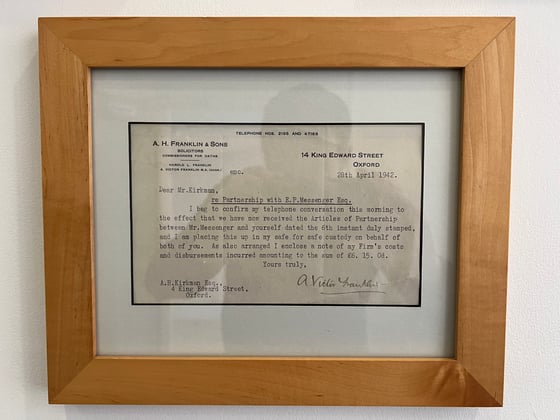
The month of April 2022 is a big one for our firm. Wellers celebrates 80 years in business!
The partnership was originally formed in the midst of the Second World War by Ernest Messenger, a Chartered Surveyor, and his brother-in-law, Alfred Kirkman, an accountant. The pair spotted an opportunity when farmers had to start paying tax and file accounts rather than be assessed.
They started out in 8 King Edward Street, Oxford. Incredibly, this continues to be the venue for our Oxford office to this day! About a decade after the partnership was formed, George Weller joined and his name has carried ever since.
The birthday means our firm has lived through some momentous, historic occasions. Some of these include Queen Elizabeth II's coronation, 14 Prime Ministers, the rebuild of Europe through the Marshall Plan, a Cold War and nuclear arms race, the civil rights movement, the rise of container shipping, the space race, the collapse of the Berlin Wall, the end of apartheid, the rise of the internet, the foundation of the European Union, Brexit, and the COVID-19 pandemic.
We've seen a few mergers along the way, employed many great staff, connected with a vast array of wonderful clients, and expanded into different locations. In acknowledging this significant anniversary we've looked back through the annuls of time, and in doing so, asked the question, what is the objective of being in business? The answer to which, as you will see, holds the key as to how we've endured for so long.
Historically, the traditional thinking has been that businesses exist to serve their shareholders, by generating profits and a return on investment. However, the passage of time has seen vast changes in society since Milton Friedman originally came up with the shareholder primacy concept.
Today, consumers and employees are likely to demand far more from the organisations they buy from, and work at. This means creating shareholder value alone may no longer suffice. Instead, the answer could be a combination of:
Perhaps another that could be added to this list is, to survive and thrive in the long run.

In a world where we're constantly fed metrics and numbers, it's easy to be pulled into short termism and comparison to our nearest competitors. A form of finite thinking and a case of maximising the returns of today, potentially at the expense of trading tomorrow. Might this approach result in businesses that are created for the short term, purely for when economic trading conditions are good?
Maybe the best organisations are those that trade through the generations, a case of built to last? Those that extol a culture that can help power them through the inevitable highs and lows of economic cycles. Think Disney, Lego, Apple, Nike, and CostCo to name just a few. Given how long we've been going, we might be audacious enough to add our very own firm to that prestigious list!
Turning 80 years old is quite the achievement for Wellers and something we're incredibly proud of. Since 1942, over the decades, and through the generations, our firm has prospered through all manner of nationwide political, and economic, highs and lows.
It's a reflection of our strong relationships, and connections, that form the basis of how we treat each other and approach service delivery to our clients. In time this very ethos became termed 'business oxygen'. By investing in our staff, combined with the right mix of technology and training, has meant we've prospered through some very challenging circumstances, especially of late.
Our culture combined with the relationships we've forged has resulted in our firm enduring through all the change and progress over the years. The key being we've established an attitude throughout our offices whereby individuals put the welfare of clients, the team, and the firm, above self-interest. It's a case of "we before me" and, "you before I". This ensures our values and culture live long beyond any one generation, creating a lasting legacy where teamwork works to the benefit of all.
The statistics suggest we're counter to the trend, and therefore possibly onto something. According to Real Business, prior to the pandemic, just 42% of micro businesses (employing fewer than 10 people), 45% of small businesses (employing between 11 and 50 people), and 51% of medium-sized businesses (employing between 50 and 249 people) make it to the 5th birthday.
Let's therefore use this momentous occasion to take a little time to remember all the great individuals, and teams, we've worked with, while reflecting and rejoicing in the ups and downs of being in business. Who knows what the future holds? All we can be sure of is that the right mix of people, values, training, relationships, and team culture ensured we grew through both the good times, and multiple moments of uncertainty, in the past.
Keeping our culture alive and well will ensure we can meet the multiple challenges ahead with confidence. The game of business never stops, it's a continuous journey of learning, humility, growth, and improvement. Happy birthday Wellers, here's to at least another 80 years!
The content of this post was created on 27/04/2022 and updated on 05/05/2022.
Please be aware that information provided by this blog is subject to regular legal and regulatory change. We recommend that you do not take any information held within our website or guides (eBooks) as a definitive guide to the law on the relevant matter being discussed. We suggest your course of action should be to seek legal or professional advice where necessary rather than relying on the content supplied by the author(s) of this blog.
Click below for office location details
leave a comment -